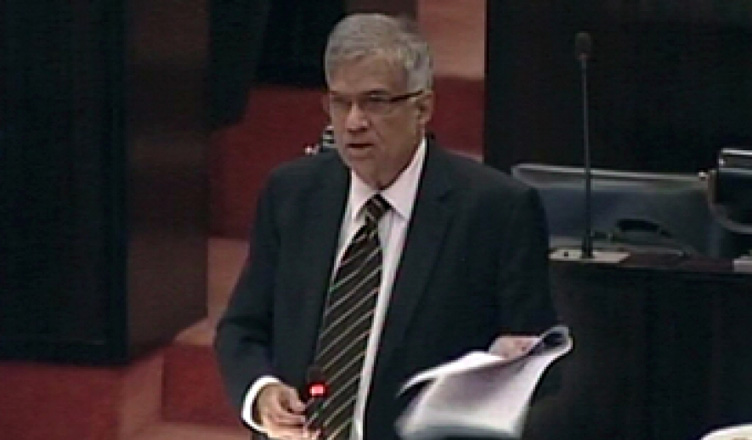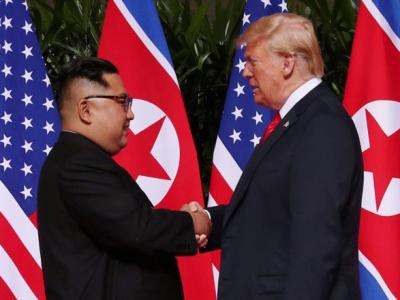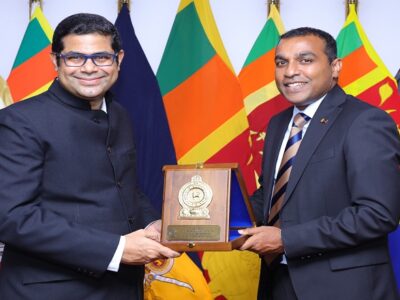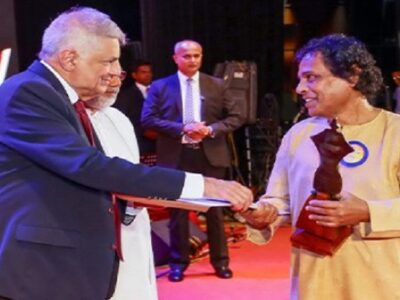(LANKAPUVATH | COLOMBO) –Prime Minister Ranil Wickremesinghe in parliament today emphasized the need to re-introduce the sectoral committee system as part of political reforms that must be carried out in parallel with the economic program.
Proposing to re-introduce the sectoral committee system as a step to strengthen the parliament, the Prime Minister said under this system, the entire Parliament contributes to policy formulation and governance, regardless of party or opposition.
He pointed out that in the present political culture the opposition focuses on opposing the Government and has no chance of coming together to formulate policies related to governance in the country.
Under the committee system, the government will have to move away from individual opinion and reach a common consensus. The opposition cannot limit itself to criticism, but contribute to finding solutions, he said.
The Premier said former Speaker Karu Jayasuriya has prepared a proposal that would activate the sectoral committees while empowering them and requested the House to study the report and add their positive comments and suggestions to it.
“We must establish these sectoral committees as a matter of urgency. Let’s empower the House, and lay the foundation for a new political culture,” he said.
Following is the Prime Minister’s full speech:
Today, in addressing the crisis that has struck our country, the primary focus has to be on stabilizing the economy. Followed by creating a new economic framework. We are now carrying out these activities in an organized manner.
I have pointed out on many occasions that we need to carry out a number of other reforms in parallel with the economic program. At this time, we should make as many political reforms as possible. The institution that must be strengthened is the parliament, while the government institutions must be free from politicization. The 22nd Amendment is one step towards achieving this. Strengthening parliamentary sectoral committees is another step.
I have emphasized on many occasions before that the sectoral committee system that was in place in our parliament before independence should be re-introduced. Under this system, the entire Parliament contributes to policy formulation and governance, regardless of party or opposition.
The political culture that has developed so far in our country is undergoing a complete change. Nowadays we divide into parties during elections. Even after coming to the parliament, the divisions remain and grow. The Government alone brings orders, formulating policies. The state is in control. The opposition focuses on opposing the Government. The opposition has no chance of coming together to formulate policies related to governance in the country.
Under this committee system, the government will have to move away from individual opinion and reach a common consensus. The opposition cannot limit itself to criticism, but contribute to finding solutions.
If we want to get out of this situation that our country is in today, there should be a change like this in the Parliament. No matter who is in power or who is in the opposition, the entire Parliament should contribute to the process of building the country.
Many MPs in this parliament demanded that such a program be implemented, especially the young MPs. The youth members of the ruling party, who do not have ministerial duties, as well as the youth members of the opposition, have repeatedly expressed their opinions on the importance of making a collective contribution to the effort to build the country.
It is in this background that I requested the former Speaker Mr. Karu Jayasuriya to prepare a proposal that would activate the sectoral committees while empowering them.
We are handing over the report that was drafted by Mr. Karu Jayasuriya to the Parliament today. I expect the support of this whole Parliament to study, discuss and implement that report very soon.
I would like to recall an important point that I have emphasized in this Parliament on several occasions. In this time of crisis, the responsibility and duty of all of us is not to dwell on the past. Support with the same amount of energy to get us out of this crisis.
Our country needs a new political culture. It is my belief that the program of strengthening this sectoral committee system will be a very strong foundation to create such a new political culture.
We hope to achieve four main objectives through the proposed Oversight Sectoral Committees.
1. Providing relief to the community and families affected by the economic crisis.
2. Economic recovery of the country and the country’s industries.
3. Upliftment of the people and society as a whole
4. Revitalization of government institutions and the governance structure for the above threefold process.
Also, this report proposes to empower sixteen monitoring sectoral committees in order to achieve these issues.
1. Committee to Alleviate the Impact of the Economic Crisis.
2. Energy and Transportation Committee.
3. Committee on Food, Security and Agriculture.
4. Committee for Promotion of Production and Export of Goods and Services.
5. Education Committee.
6. Health Committee.
7. Committee for Open and Accountable Public Servants.
8. Committee on International Relations.
9. Committee on National Security.
10. Committee on Foreign Employment and Labor.
11. Committee on Justice and Law Respecting Society.
12. Environment, Natural Resources and Sustainable Development Committee.
13. Committee on Media, Youth, National Heritage and New Citizen.
14. Committee for Reconciliation and National Unity.
15. Committee on Children, Women and Gender.
16. National Economic and Physical Planning Committee.
Mr. Karu Jayasuriya’s report has also pointed out the importance of bringing together non Parliamentary-member youths for these committees through a formal method. This point is also very important. There are a large number of young people who do not want to be directly involved in politics. A way to get their ideas and suggestions in preparing the country’s policies and plans is provided through this.
Also, the report has suggested the possibility of getting advice from scholars and experts.
Thus, through the sectoral committee system, the entire parliament joins the process of uplifting the country, regardless of party or opposition. Also, the youth community, scholars and experts are provided an opportunity to participate in these committees.
By successfully implementing this system, on the one hand, there will be a huge change in our political culture. On the other hand, there will be a support base to build the future of the country. A solid foundation is being built for the purpose of creating a developed Sri Lanka. A real system change begins.
So I request this honorable House to study this report and add your positive comments and suggestions to it. We must establish these sectoral committees as a matter of urgency. Let’s empower the House, and lay the foundation for a new political culture.




